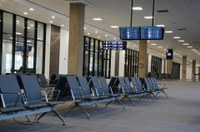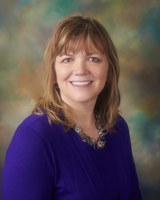Prairie Fare: Remember These Sleep Hygiene Tips
(Click an image below to view a high-resolution image that can be downloaded)
“Julie was last seen in Gate F-4,” I texted to my husband at 1 a.m.
I began walking across the airport as the crowds thinned and the final flights arrived.
“Julie was last seen in Gate C-14,” I texted my husband at 2 a.m.
He was probably quite confused when those messages arrived. I was informing him just in case I ended up on an episode of “Whatever happened to Julie” on a mystery show.
He knew my 11 p.m. flight was canceled. I opted out of the free hotel stay. That would have meant going through security at 4:30 a.m. to catch an early flight home.
Unfortunately, I cannot sleep in public places. I also have an active imagination.
I wandered around the airport. I surprised a cleaning crew when I popped up from my somewhat hidden spot. The worker was singing loudly as he drove a vacuum cleaner by my gate.
Sleep evaded me that evening. Millions of people experience sleep challenges, even at home. About one-third of adults do not get enough sleep.
Lack of sufficient sleep puts us at risk for many health conditions. We all need sleep to maintain our daily functioning at work and home.
According to the Centers for Disease Control and Prevention, not enough sleep is linked to chronic diseases and conditions including heart disease, high blood pressure, obesity, Type 2 diabetes and depression.
Ongoing lack of sleep is linked to early death according to some researchers. Adults need at least seven hours of sleep every night. Younger people need more sleep. For example, teens need at least eight hours of sleep, and infants need 12 to 16 hours of sleep.
As I perused the empty airport, I wondered who might be lurking around the next corner at 3 a.m.
I should not have been thinking about all of this when I was trying to get a few minutes of sleep. I defied nearly every “rule” for sleep that night.
“Sleep hygiene” is the name given to habits that help promote sleep. That term has nothing to do with taking a warm bath before bed, although that would have been nice.
Unfortunately, I didn’t even have a toothbrush with me.
We should try to have a consistent bedtime. We are advised to avoid the “sleeping in” pattern on weekends.
We also should aim for a dark, quiet sleeping area at a comfortable, slightly cool temperature. Some light exercise is OK before retiring for the evening.
The airport was brightly lit, although they reduced the lighting a bit after the last flight. They evidently turn down the airport heat at night. I had a sweater in my backpack so I covered myself.
A backpack does not make a good pillow, by the way.
I moved closer to the media plug-ins and began perusing social media on my phone.
With my phone use, I broke another rule for sleep. Using electronic devices in your sleeping area is not advised. The blue light emitted can affect sleep because it interferes with a natural sleep-promoting hormone called melatonin.
I was a little hungry. No vending machines were available in my area.
I reached into my backpack. I found a crushed soft-granola bar. That was better than nothing.
Large meals are not advised before bed, anyway. Your body gets busy digesting the food.
I was thirsty and all I had was a diet cola. I knew that caffeine would make my insomnia situation worse, but this was all I had available.
I decided to wander around a bit more at 3:45 a.m. I had never tried the massage chairs in the hallway. I put my credit card in the slot for my 20-minute massage.
Stretching your muscles is a good plan to promote sleep.
The massage chair began squeezing my calves and pummeling my back. I almost jumped out of the chair. My muscles were tense. I had paid $5 for the massage so I was going to make it through.
I really wished that I had not watched those “Halloween” movies in my youth. I was half-expecting claws to come out of back of the chair and the leg massagers to prevent me from escaping.
At 4 a.m., the airport came alive with bright lights. The shuttles were whizzing back and forth with no passengers.
Here’s another tip about sleep: Don’t scare yourself.
I arrived home at about 10 a.m. after another delay on the plane. I needed to drive and make a presentation 70 miles away.
I made a very strong cup of coffee. I was well aware that drowsy driving is linked to crashes.
In fact, 83,000 crashes occurred between 2005 and 2009 according to statistics from the National Highway Traffic Safety Administration. Fortunately, the caffeine worked well.
I was hungry for something refreshing later that day. Here’s a tasty fruit bowl to make for breakfast or dessert.
Breakfast Fruit Bowl
3 tablespoons frozen orange juice concentrate (unsweetened)
2 medium apples, rinsed and diced with peel
1 medium orange, peeled and diced
1 medium banana, peeled and sliced
Place orange juice in medium bowl. Add prepared fruits to bowl and toss lightly to coat with orange juice. Substitute your favorite fruits or other seasonal fruits, such as grapes or melon.
Makes four servings. Each serving has 80 calories, 0 grams (g) fat, less than 1 g protein, 20 g carbohydrate and 0 milligrams sodium.
(Julie Garden-Robinson, Ph.D., R.D., L.R.D., is a North Dakota State University Extension food and nutrition specialist and professor in the Department of Health, Nutrition and Exercise Sciences. Follow her on Twitter @jgardenrobinson)
NDSU Agriculture Communication – April 14, 2022
Source: Julie Garden-Robinson, 701-231-7187, julie.garden-robinson@ndsu.edu
Editor: Elizabeth Cronin, 701-231-5391, elizabeth.cronin@ndsu.edu




